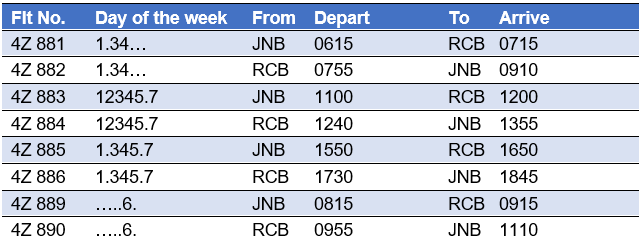Airlink, Southern Africa’s independent premier airline, is boosting its Johannesburg-Richards Bay service with the introduction of a jet service on the route.
The enhanced service, which commenced yesterday (December 4), sees a significant increase in capacity, with Airlink’s 74-seat Embraer E170 jetliners replacing the 29-seat Jetstream 41 turboprop aircraft. In addition, flight time is reduced by up to 30 minutes.
“Richards Bay is crucial to South Africa’s economy and it requires reliable and efficient air services, like Airlink’s, to connect the city’s businesses and those dependent on it with other markets and economic centres.
“We are also keeping the promise we made to our partners, the City of uMhlathuze and the KwaZulu Natal government, to deploy larger aircraft on the route once there was sufficient demand,” said Airlink CEO and MD, Rodger Foster.
Flights on the route will operate on this schedule:

Upgrade ‘crucial’
Acsa noted that the aircraft upgrade was not only a milestone for Airlink but also crucial for the airport and the community of uMhlathuze. With the increased seating capacity, there will be more opportunities for travel and enhanced cargo movement.
Since the reopening of the airport post-COVID-19, Airlink was the only carrier that returned to operate out of Richards Bay, servicing the Johannesburg-Richards Bay route, out of the three that previously operated from Richards Bay, according to Richards Bay Local Airport Manager, Langa Ndebele.
“Richards Bay Airport is an important airport in the region, facilitating the movement of goods and passengers from an economic hub of some considerable force, and the role that the airport is playing in the continued economic development of this region is significant.”
Acsa has partnered with the uMhlathuze Municipality through a multi-year contract to manage the Richards Bay Airport after it remained closed for almost two years.
The partnership will see the transfer of skills among others, as well as bringing much-needed revitalisation of the local economy through the optimisation of the transport infrastructure, where Acsa will play a pivotal role.
























